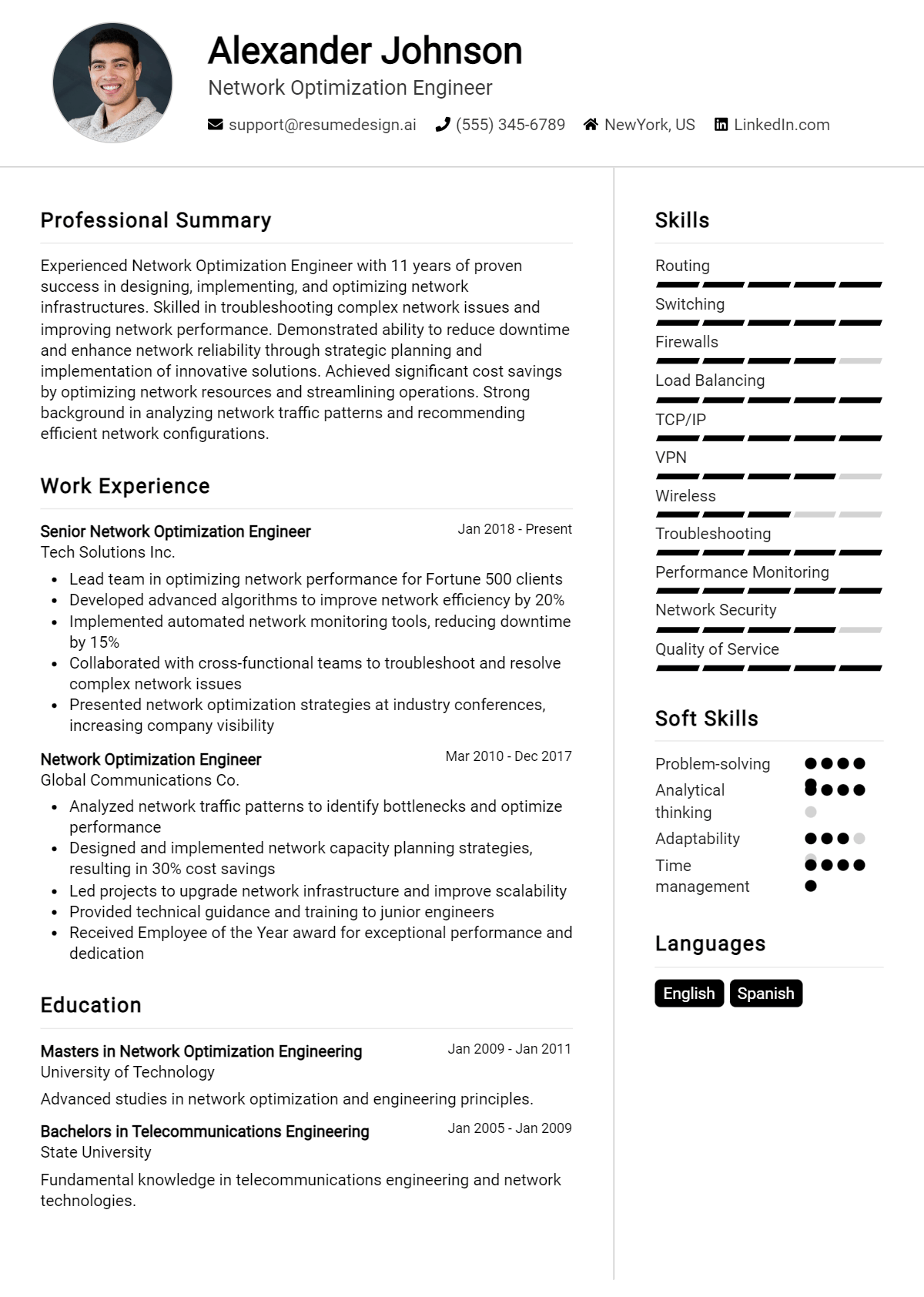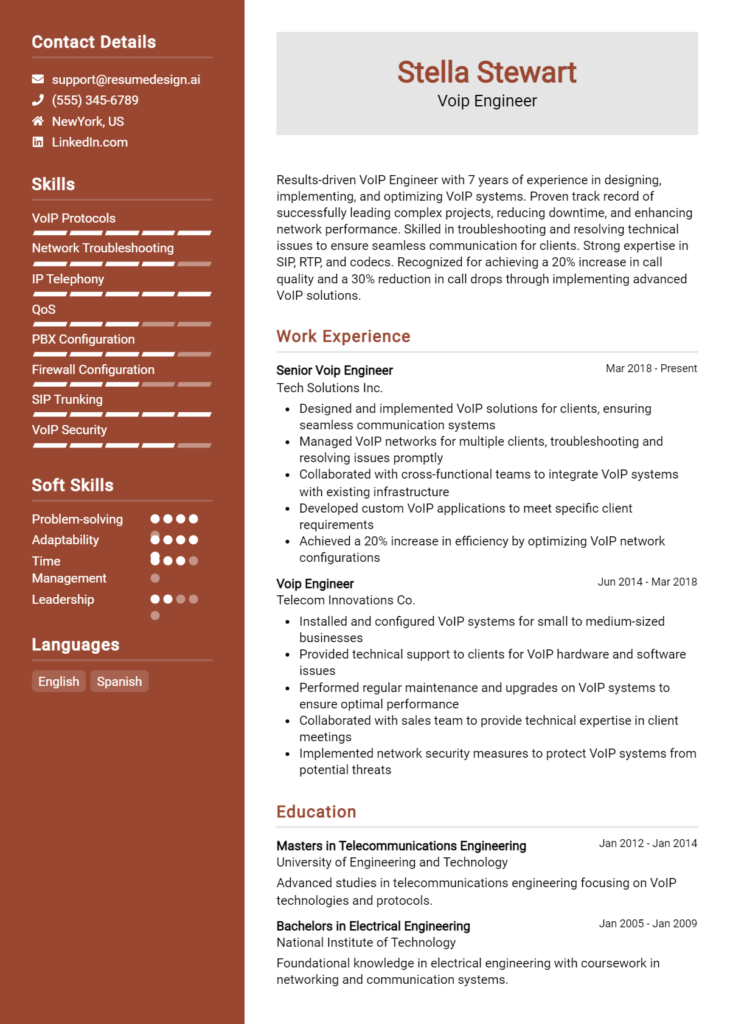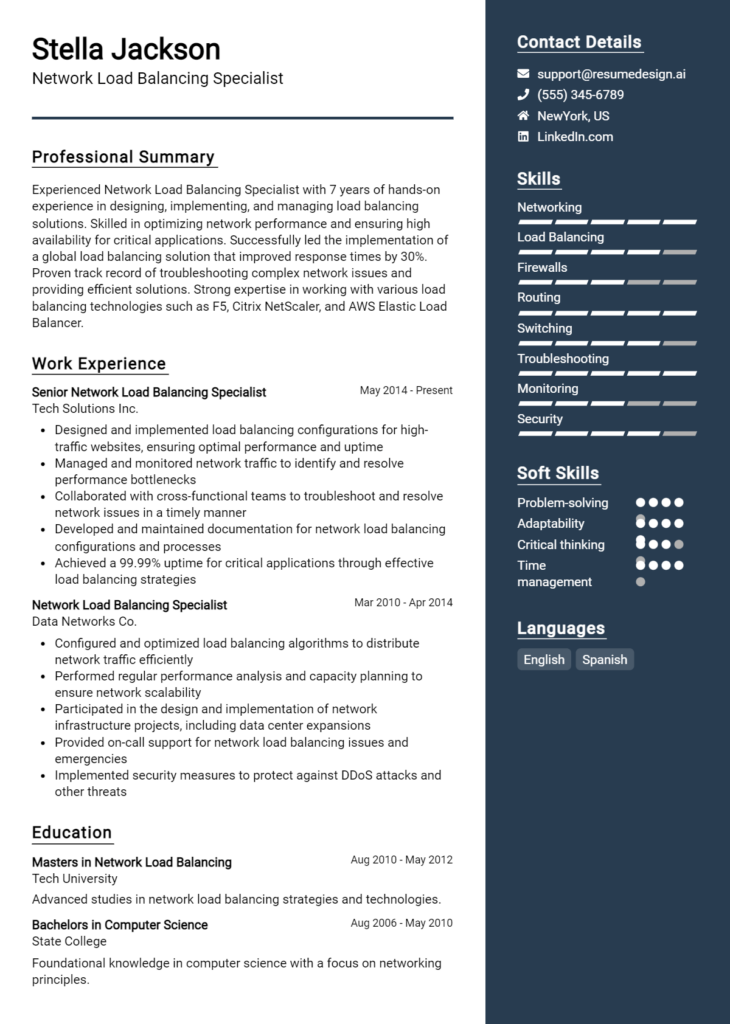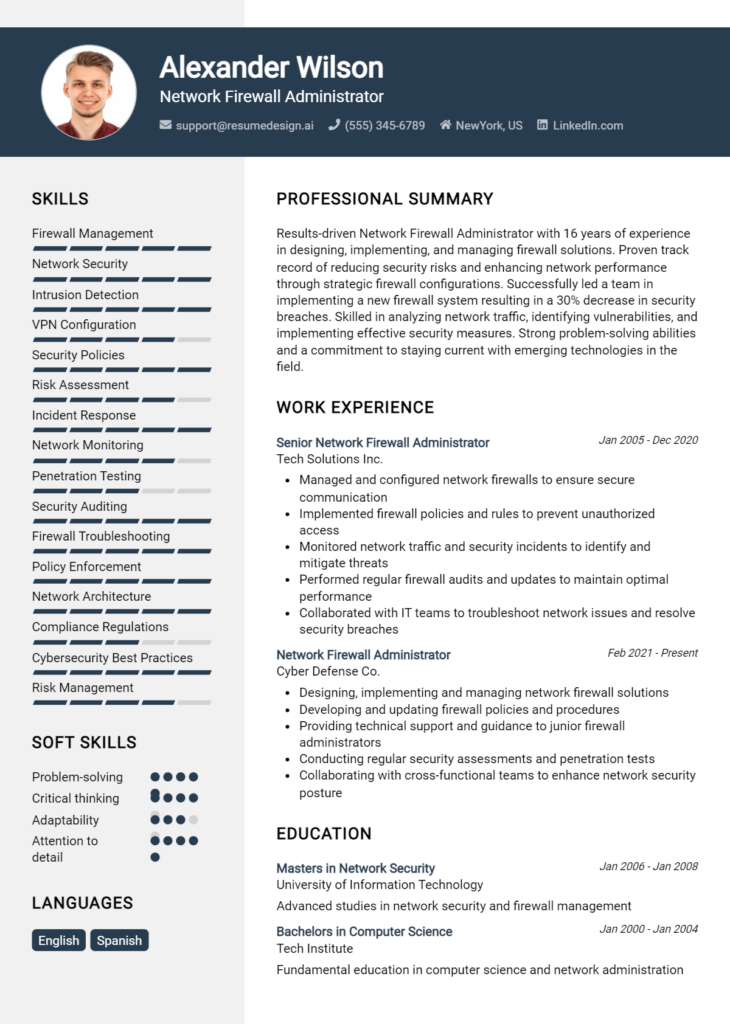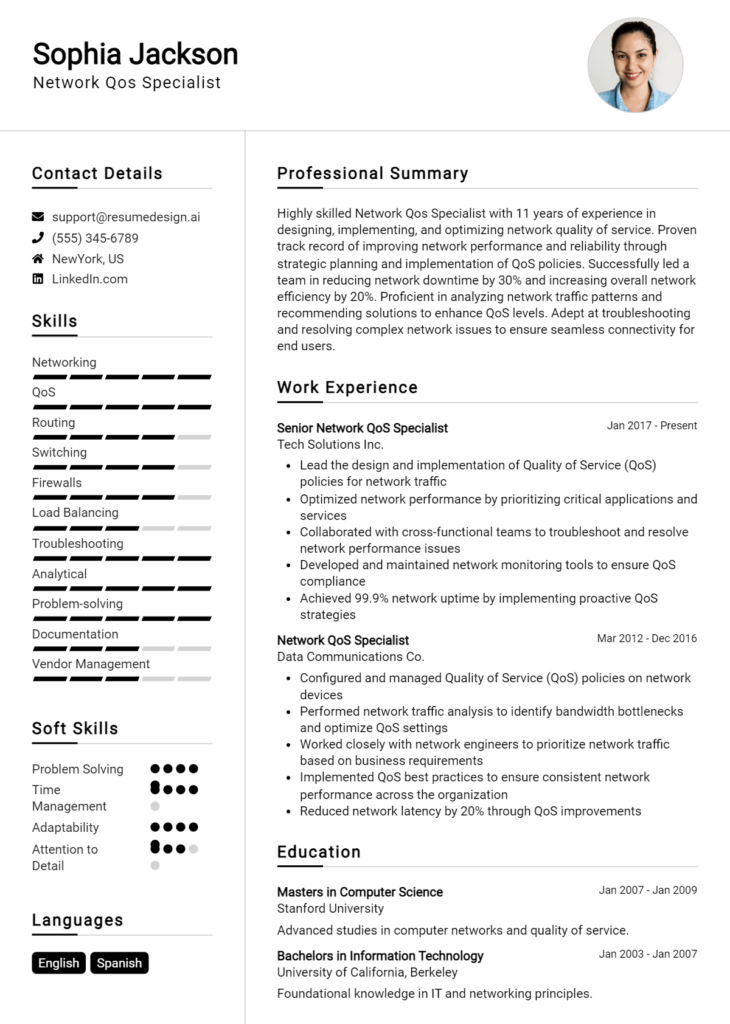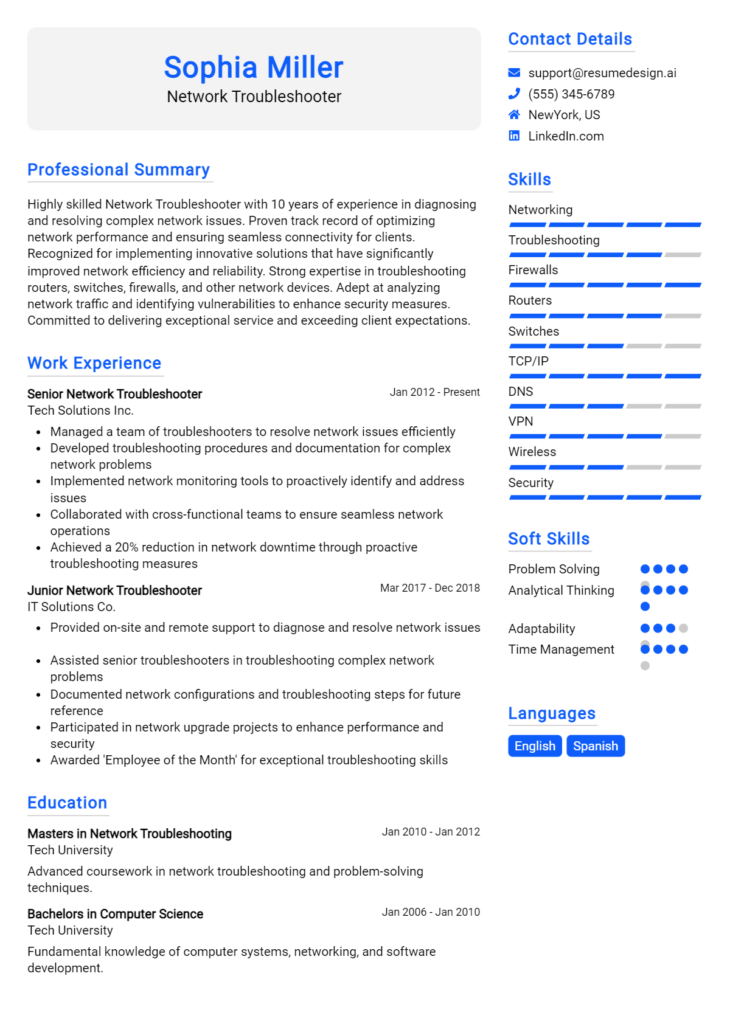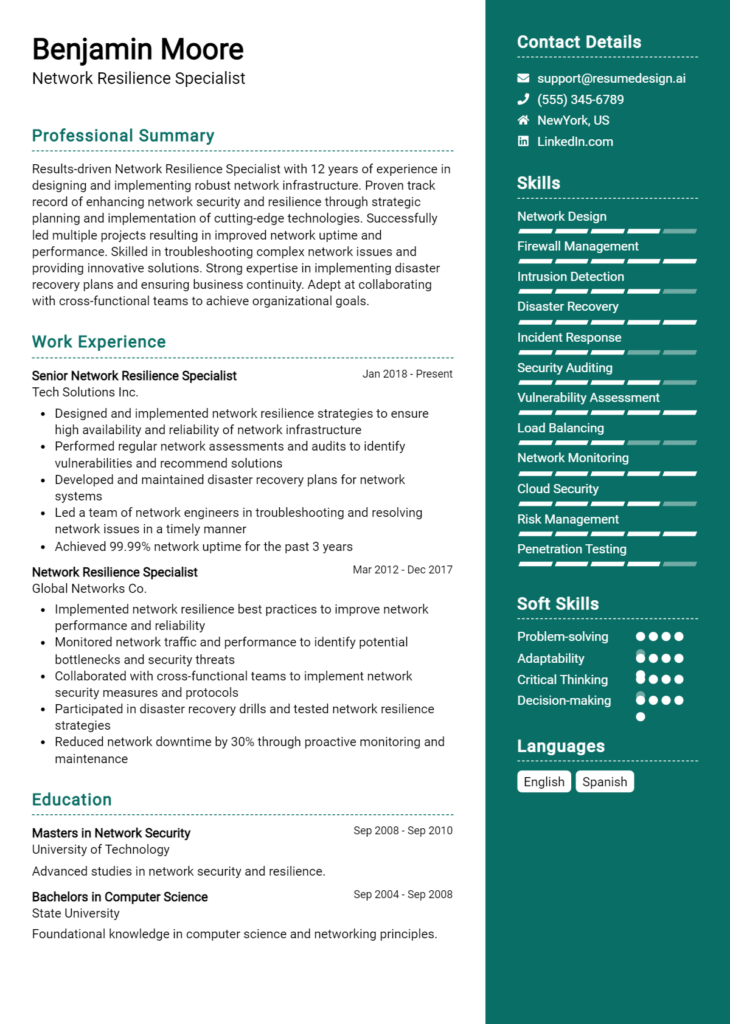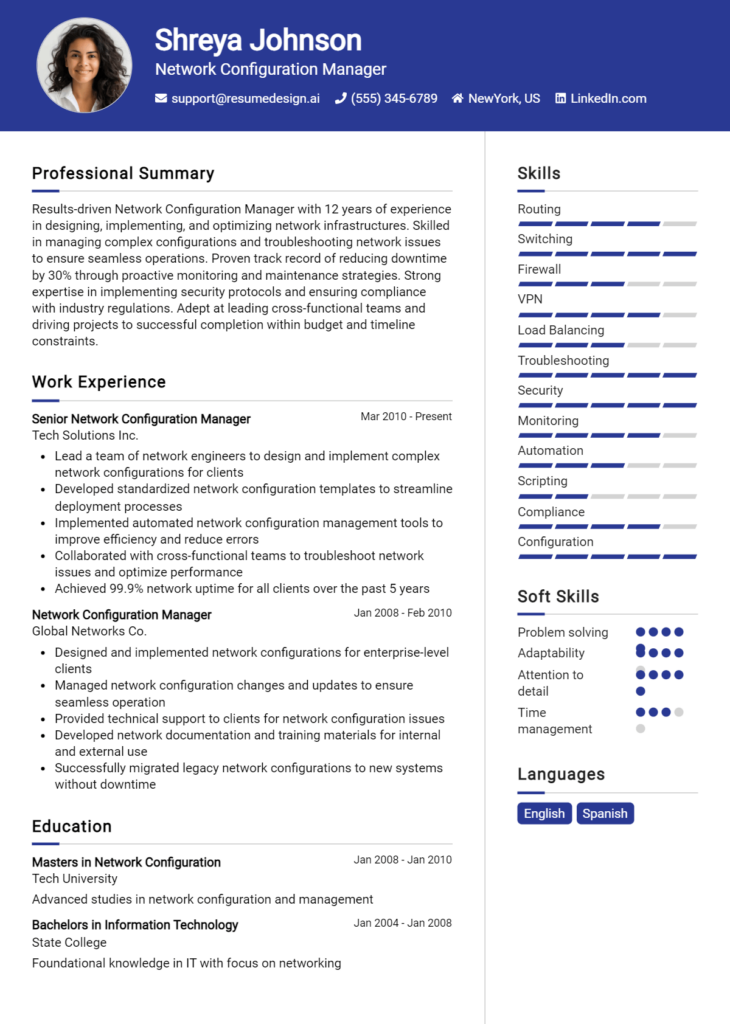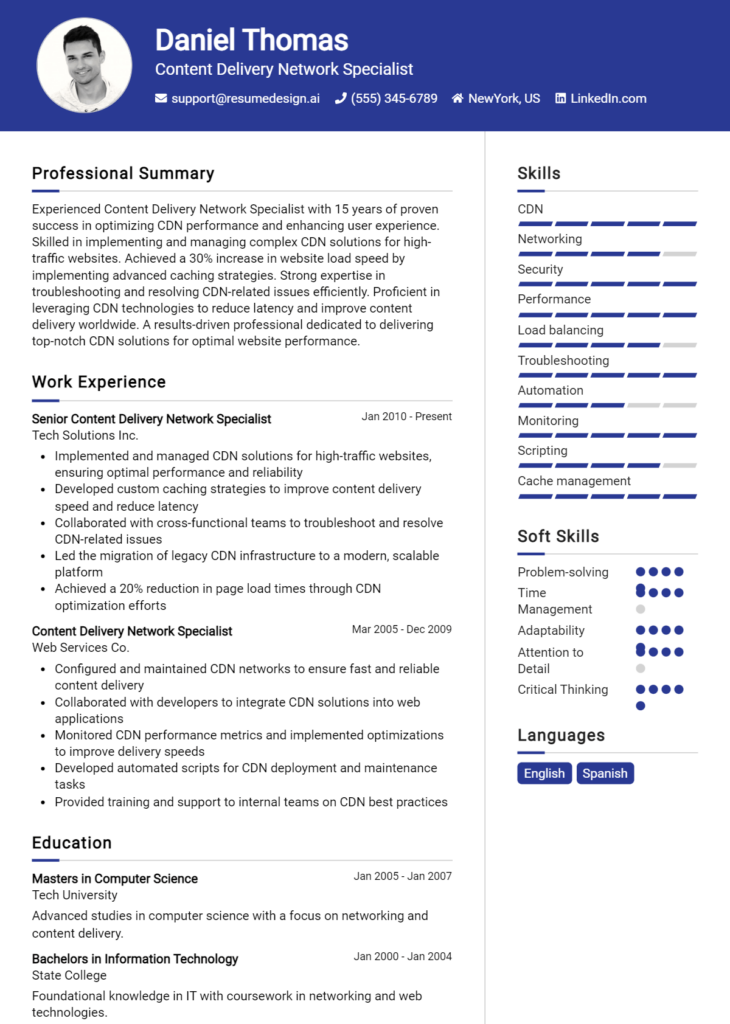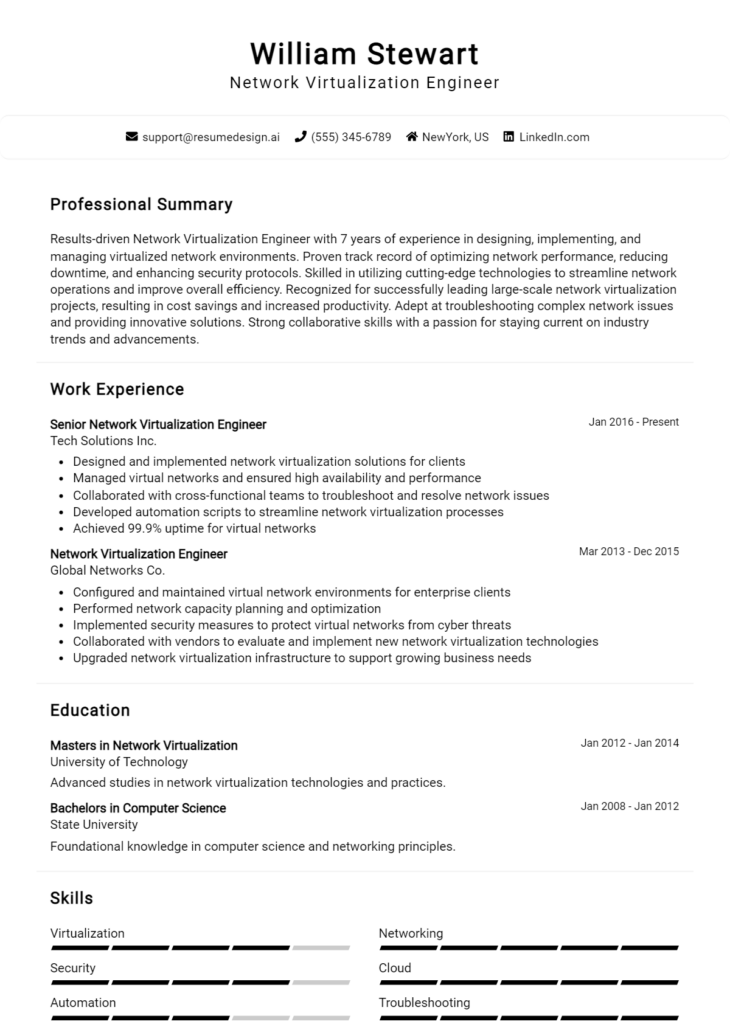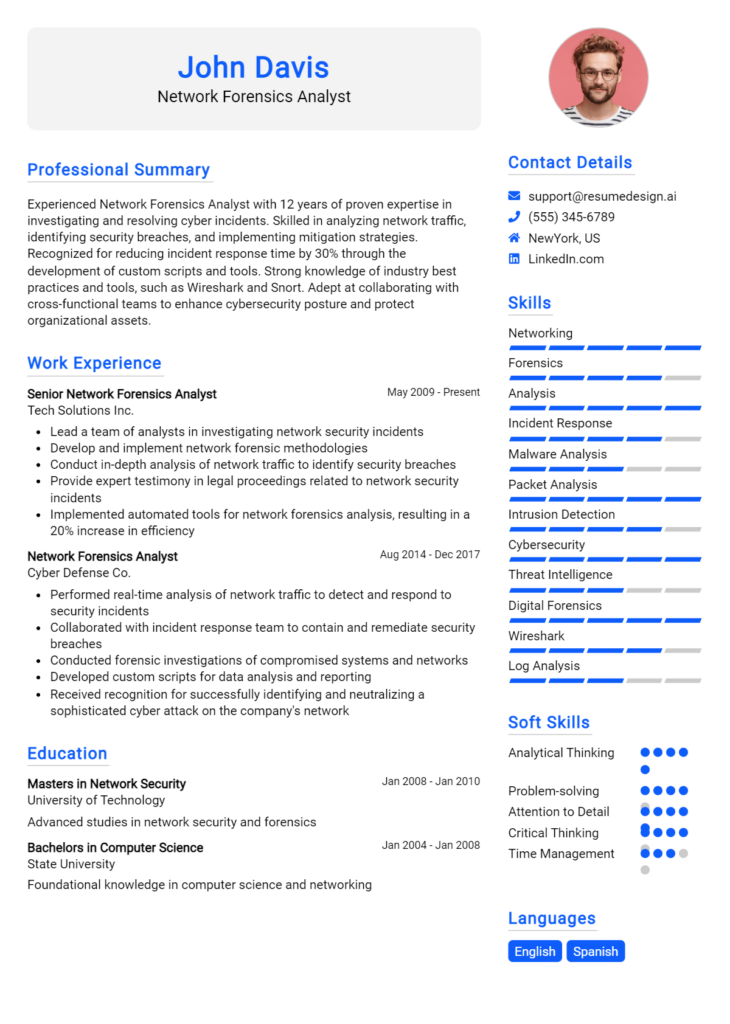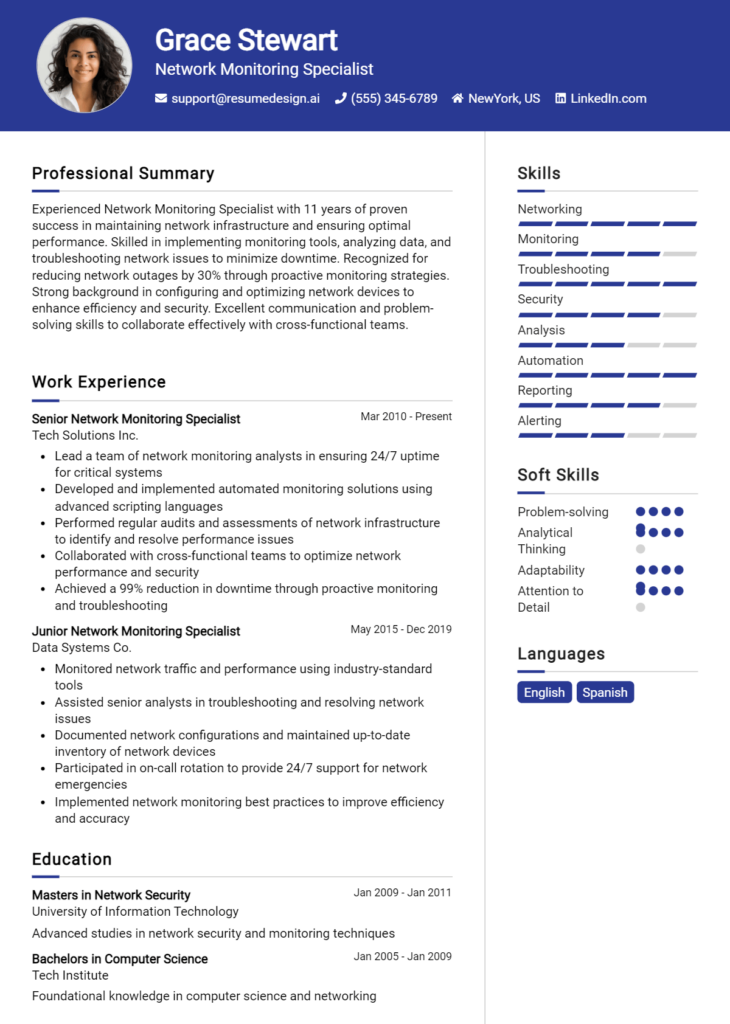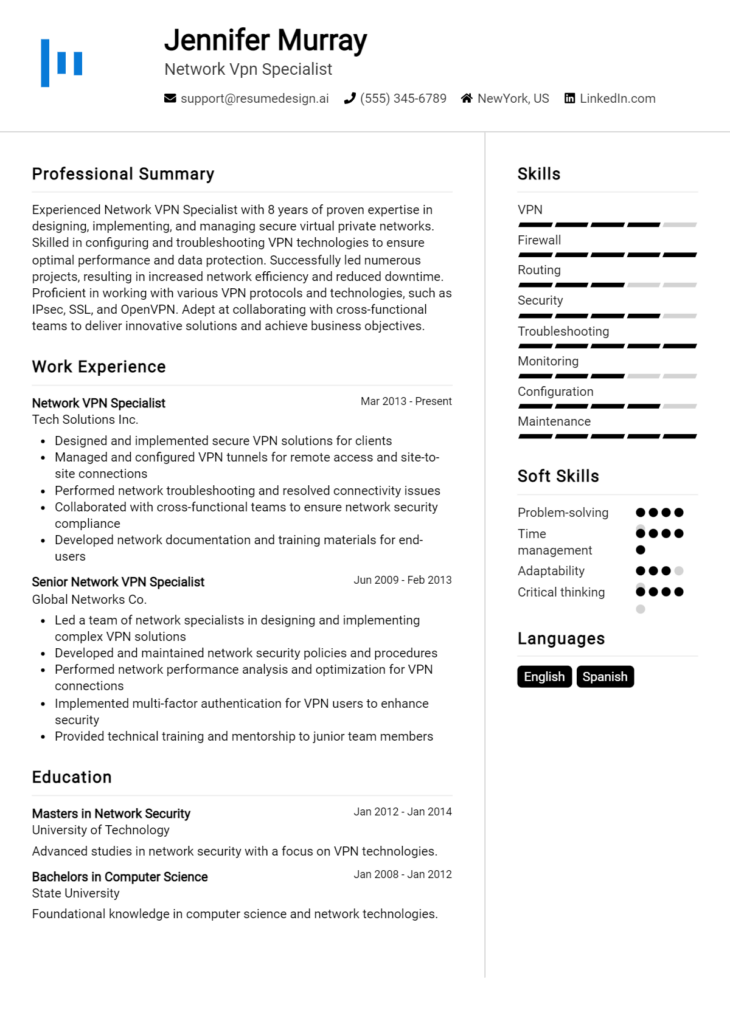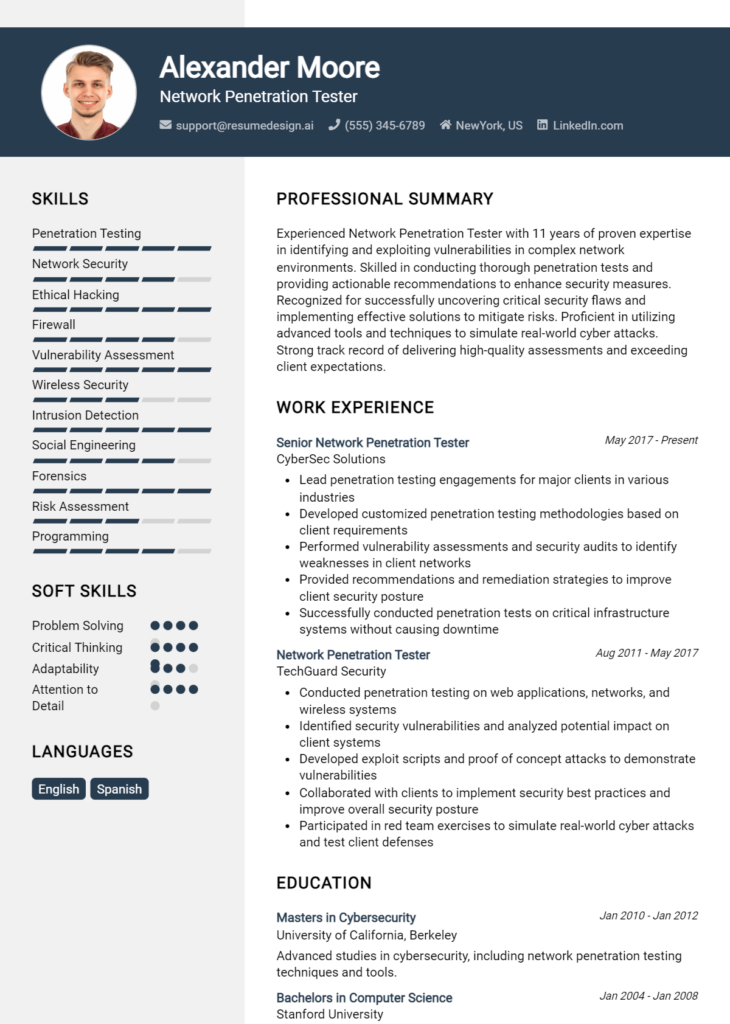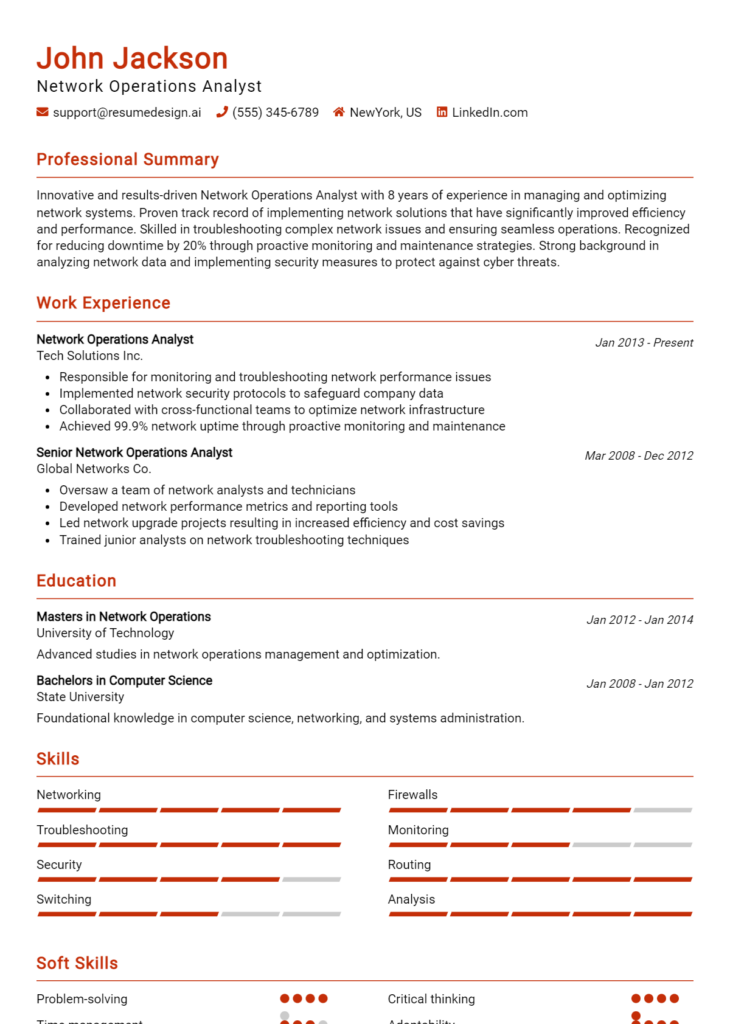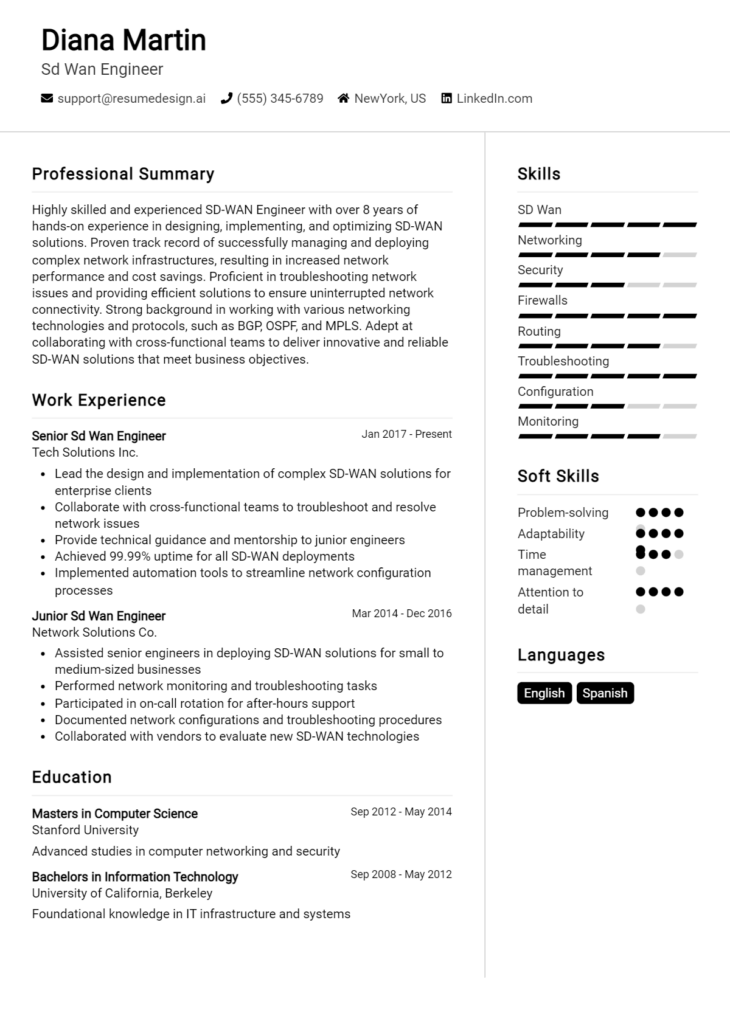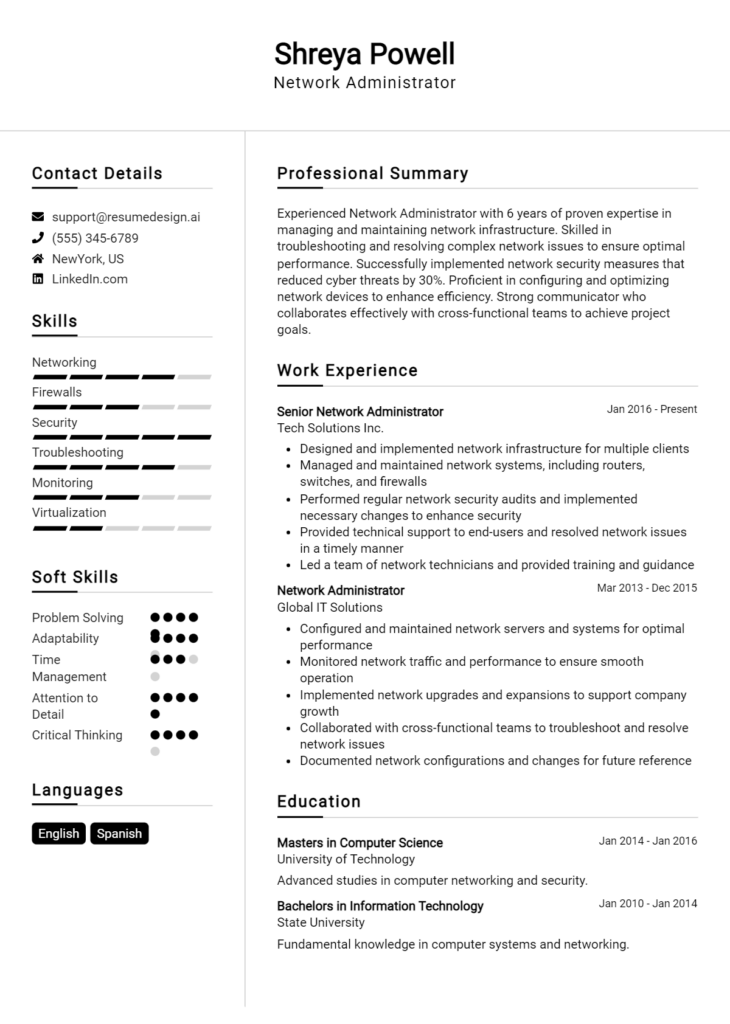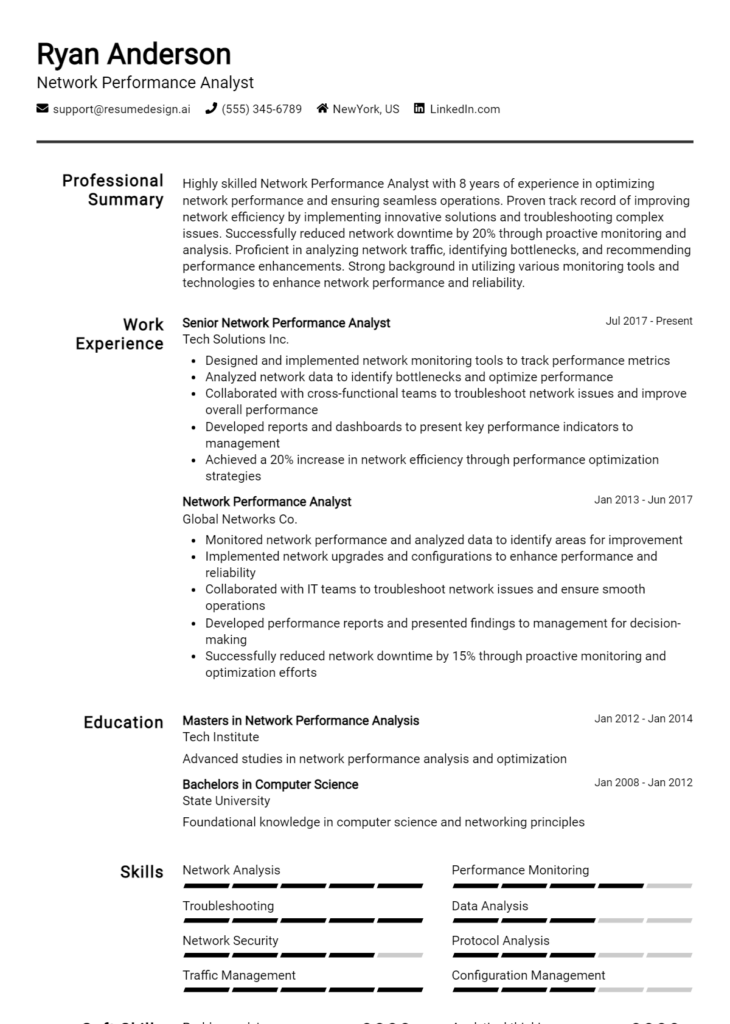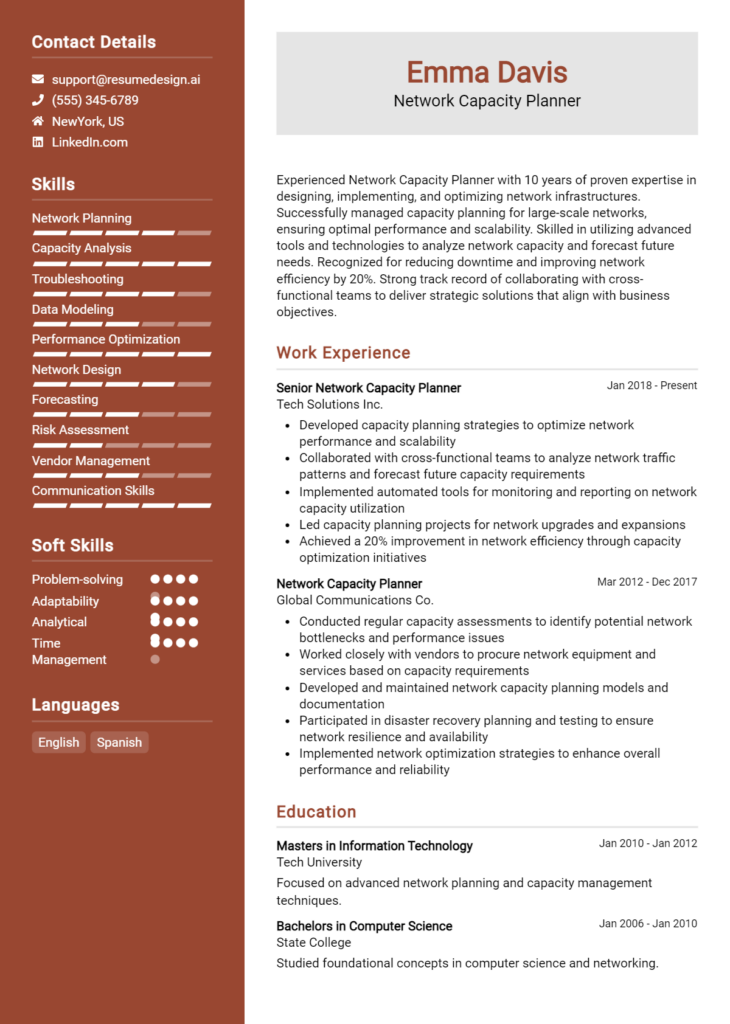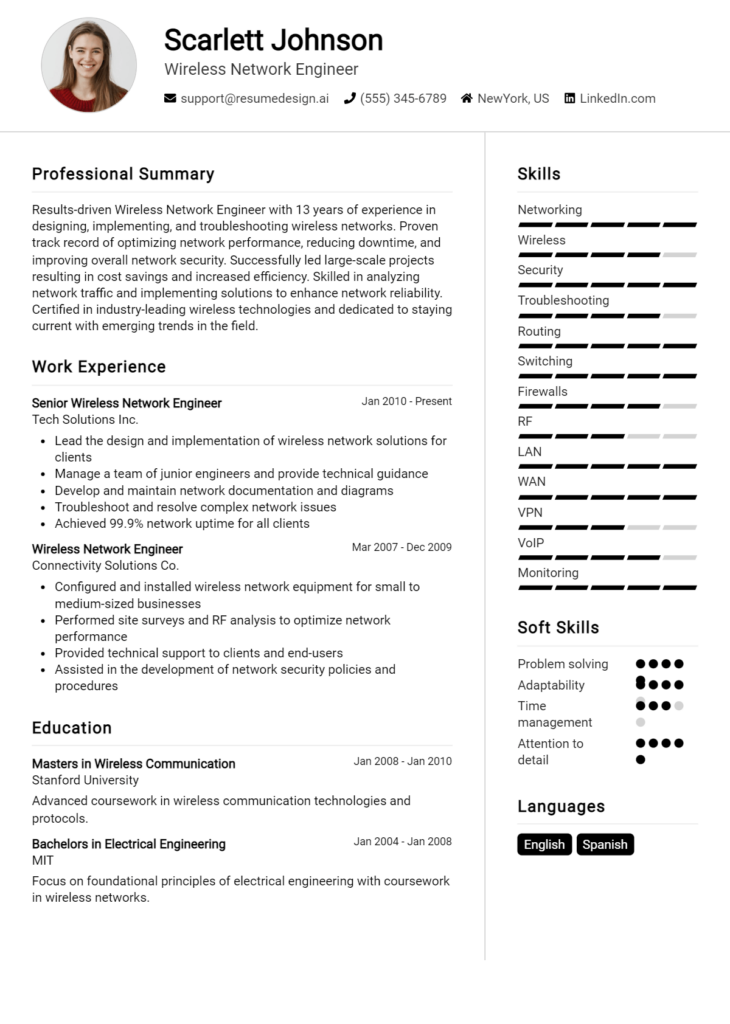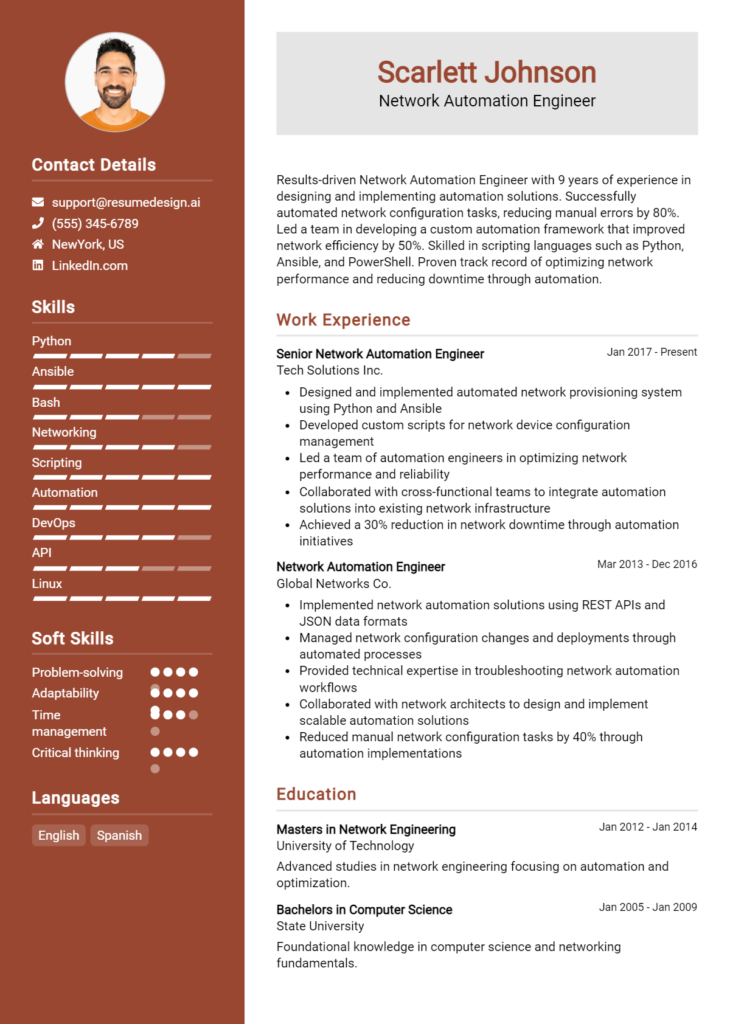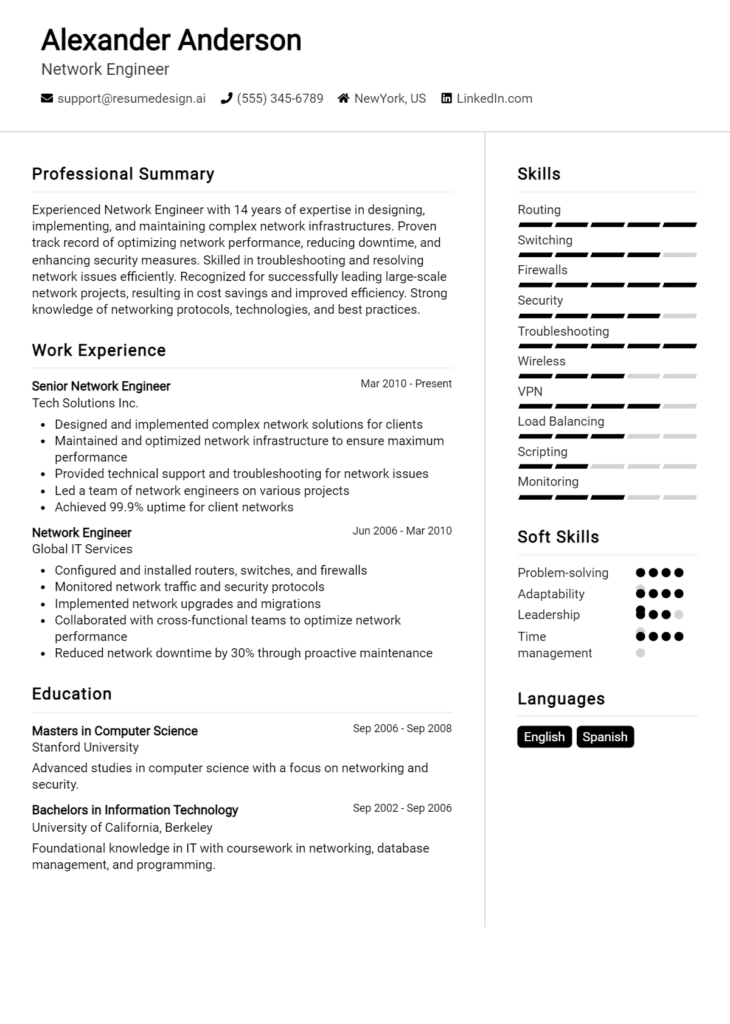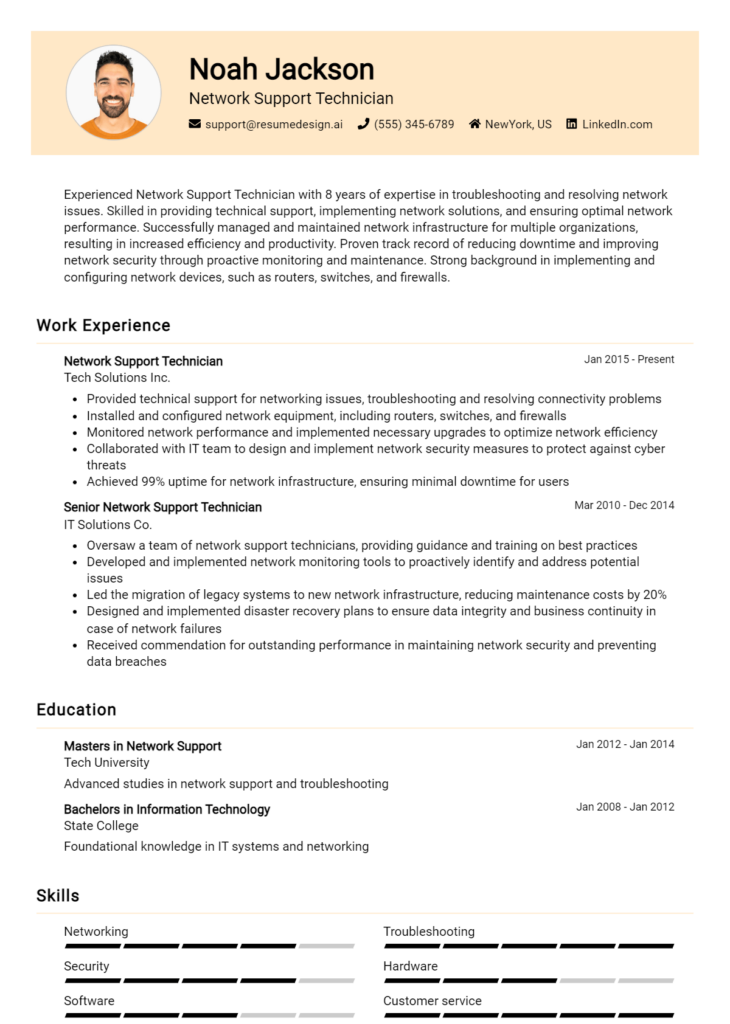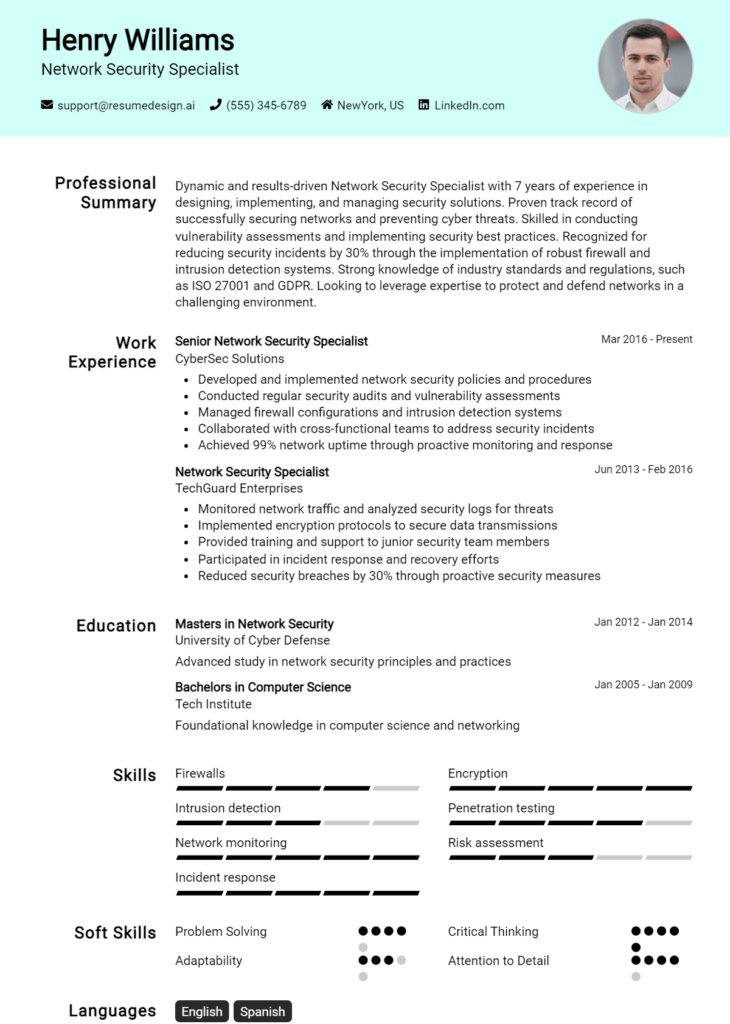Network Optimization Engineer Core Responsibilities
A Network Optimization Engineer plays a vital role in enhancing network performance by analyzing data and implementing solutions across various departments, including IT, operations, and customer service. This position requires strong technical knowledge in network protocols, operational insights for effective troubleshooting, and exceptional problem-solving skills to address complex issues. By effectively utilizing these skills, engineers contribute significantly to organizational goals, ensuring seamless connectivity and efficiency. A well-structured resume can highlight these qualifications and showcase the engineer's ability to bridge departmental gaps.
Common Responsibilities Listed on Network Optimization Engineer Resume
- Analyze network performance metrics and identify optimization opportunities.
- Design and implement network configuration changes to enhance efficiency.
- Collaborate with cross-functional teams to troubleshoot and resolve connectivity issues.
- Develop and maintain documentation for network optimization processes.
- Conduct regular assessments of network capacity and performance.
- Monitor network traffic to identify bottlenecks and propose solutions.
- Evaluate and recommend new tools and technologies for network improvements.
- Provide technical support and guidance to internal teams and clients.
- Implement best practices for network security and data integrity.
- Prepare reports and presentations to communicate optimization results to stakeholders.
- Stay updated on industry trends and advancements in network technology.
High-Level Resume Tips for Network Optimization Engineer Professionals
In the competitive landscape of technology and telecommunications, a well-crafted resume is pivotal for Network Optimization Engineer professionals. This crucial document serves as the first impression a candidate makes on potential employers, encapsulating their skills, experiences, and accomplishments in a concise format. A resume that effectively showcases both technical proficiency and noteworthy achievements can significantly enhance a candidate's chances of standing out in a crowded job market. In this guide, we will provide practical and actionable resume tips specifically tailored for Network Optimization Engineer professionals, ensuring that your resume aligns with industry expectations and highlights your unique qualifications.
Top Resume Tips for Network Optimization Engineer Professionals
- Tailor your resume to match the job description by using relevant keywords and phrases from the posting.
- Highlight your technical skills, such as proficiency in routing protocols, network design, and performance analysis tools.
- Showcase relevant experience, including specific projects that demonstrate your expertise in network optimization techniques.
- Quantify your achievements with metrics, such as percentage improvements in network performance or reductions in latency.
- Include certifications relevant to the field, such as CCNP, CCIE, or specific vendor certifications that enhance your credibility.
- Utilize a clean, professional format that emphasizes clarity, making it easy for recruiters to navigate your resume.
- Incorporate soft skills that are essential in the role, such as problem-solving, analytical thinking, and effective communication.
- Consider adding a summary statement at the top that encapsulates your experience and career goals in network optimization.
- Keep your resume concise, ideally one page, and focus on the most relevant information to the position you are applying for.
- Regularly update your resume with new skills, experiences, and certifications to ensure it reflects your current qualifications.
By implementing these tips, Network Optimization Engineer professionals can significantly increase their chances of landing a job in this specialized field. A well-structured resume that effectively communicates technical capabilities and relevant experiences will not only capture the attention of hiring managers but also set a candidate apart as a strong contender for the role. Taking the time to refine your resume is an investment in your career advancement.
Why Resume Headlines & Titles are Important for Network Optimization Engineer
In the competitive field of network optimization engineering, a well-crafted resume headline or title plays a crucial role in capturing the attention of hiring managers. A strong headline can serve as a powerful first impression, summarizing a candidate's key qualifications and unique value proposition in a concise and impactful manner. It should be directly relevant to the job being applied for, showcasing specific skills or achievements that align with the employer's needs. By effectively highlighting the candidate's strengths, a compelling headline can significantly enhance the overall appeal of the resume and increase the likelihood of advancing through the hiring process.
Best Practices for Crafting Resume Headlines for Network Optimization Engineer
- Keep it concise: Aim for one to two lines that summarize your expertise.
- Be specific: Use technical terms relevant to network optimization engineering.
- Highlight key skills: Focus on critical skills that are in demand for the role.
- Use action words: Start with impactful verbs to convey your achievements.
- Align with job description: Tailor your headline to match the specific job requirements.
- Showcase results: If possible, include quantifiable results or accomplishments.
- Avoid jargon: Use clear language to ensure understanding by a wider audience.
- Maintain professionalism: Ensure the tone reflects industry standards and professionalism.
Example Resume Headlines for Network Optimization Engineer
Strong Resume Headlines
"Results-Driven Network Optimization Engineer with 5+ Years of Experience in Reducing Latency by 30%."
“Certified Network Optimization Expert Specializing in High-Performance Routing Solutions.”
“Innovative Network Engineer with Proven Track Record in Enhancing Network Efficiency and Reliability.”
Weak Resume Headlines
“Network Engineer Looking for Opportunities.”
“Experienced Professional in IT.”
The strong headlines are effective because they clearly articulate the candidate's specific skills, experience, and measurable accomplishments, immediately informing the hiring manager of their expertise. In contrast, the weak headlines fail to impress due to their vagueness and lack of detail, leaving hiring managers without a clear understanding of the candidate's qualifications or how they may fit into the role. By focusing on clarity and relevance, effective headlines can significantly enhance a resume's impact.
Writing an Exceptional Network Optimization Engineer Resume Summary
A well-crafted resume summary is crucial for a Network Optimization Engineer as it serves as the first impression a hiring manager receives of a candidate's qualifications. An exceptional summary quickly captures the attention of recruiters by succinctly highlighting key skills, relevant experience, and notable accomplishments that align with the job role. By being concise and impactful, a tailored resume summary not only sets the tone for the rest of the resume but also emphasizes the candidate's fit for the specific position they are applying for, making it an essential element in the job application process.
Best Practices for Writing a Network Optimization Engineer Resume Summary
- Quantify achievements: Use numbers and metrics to demonstrate the impact of your work.
- Focus on relevant skills: Highlight technical skills that are directly applicable to network optimization.
- Tailor the summary: Customize your summary to reflect the specific job description and requirements.
- Keep it concise: Aim for 3-5 sentences that deliver maximum information with minimal words.
- Showcase problem-solving abilities: Illustrate your capability to address and resolve network issues.
- Emphasize collaboration: Mention any experience working with cross-functional teams or stakeholders.
- Incorporate industry keywords: Use terminology that is relevant to network optimization to pass through applicant tracking systems.
- Highlight certifications or education: Include any relevant certifications or degrees that bolster your qualifications.
Example Network Optimization Engineer Resume Summaries
Strong Resume Summaries
Dynamic Network Optimization Engineer with over 7 years of experience in enhancing network efficiency, achieving a 30% reduction in latency across multi-site infrastructures. Proficient in utilizing advanced analytical tools and protocols to optimize performance, ensuring seamless connectivity and uptime.
Result-driven professional with a proven track record of implementing network solutions that improved throughput by 40% for a leading telecommunications provider. Skilled in network design, configuration, and troubleshooting, with a strong understanding of QoS principles.
Innovative Network Optimization Engineer with expertise in leveraging AI-driven analytics to predict and mitigate network congestion, leading to a 25% increase in overall network reliability. Adept at collaborating with IT teams to design scalable network solutions.
Weak Resume Summaries
Network engineer with some experience in optimizing networks. I am looking for a position where I can use my skills.
Detail-oriented professional seeking opportunities in network optimization. Experienced in various network tasks and willing to learn more.
The strong resume summaries are considered effective because they are specific, quantifiable, and directly relevant to the job of a Network Optimization Engineer. They highlight measurable achievements, demonstrate industry knowledge, and showcase the candidate's ability to contribute meaningfully to potential employers. In contrast, the weak summaries lack detail and specificity, making them too generic to stand out in a competitive job market. They fail to convey the candidate's unique qualifications or any tangible results from their past work, which diminishes their impact on hiring managers.
Work Experience Section for Network Optimization Engineer Resume
The work experience section of a Network Optimization Engineer resume is crucial as it serves as a testament to the candidate's technical prowess, management capabilities, and commitment to delivering high-quality solutions. This section not only showcases the candidate's ability to optimize network performance but also highlights their experience in leading teams and projects that result in tangible improvements for the organization. By quantifying achievements and aligning experiences with industry standards, candidates can effectively demonstrate their value to potential employers, making this section a key component of a successful resume.
Best Practices for Network Optimization Engineer Work Experience
- Use specific metrics to quantify your achievements, such as percentage improvements in network performance or cost savings.
- Highlight technical skills relevant to network optimization, including specific tools, technologies, and methodologies employed.
- Focus on leadership experiences, detailing your role in managing teams and driving projects to successful completion.
- Incorporate keywords from the job description to align your experience with industry standards and expectations.
- Showcase collaboration with cross-functional teams to emphasize your ability to work effectively in diverse environments.
- Provide context for your contributions by explaining the challenges faced and how your solutions addressed them.
- Utilize action verbs to convey a sense of proactivity and impact in your roles.
- Tailor each entry to reflect the most relevant and impressive aspects of your experience for the position you are applying for.
Example Work Experiences for Network Optimization Engineer
Strong Experiences
- Led a team of engineers to implement a new network optimization protocol, resulting in a 30% decrease in latency across the organization’s primary data center.
- Designed and executed a network monitoring strategy that improved issue detection rates by 50%, reducing downtime and increasing overall network reliability.
- Collaborated with the IT department to migrate 200+ users to a new cloud-based network infrastructure, achieving a seamless transition with zero downtime.
Weak Experiences
- Worked on network optimization projects.
- Assisted in improving network performance.
- Participated in team meetings regarding network issues.
The examples provided above illustrate the difference between strong and weak experiences in a Network Optimization Engineer's resume. Strong experiences focus on specific, quantifiable outcomes and demonstrate leadership, technical expertise, and collaboration, making a clear impact on the organization. In contrast, weak experiences lack detail and fail to convey the candidate’s contributions or the significance of their roles, resulting in a less compelling case for their qualifications.
Education and Certifications Section for Network Optimization Engineer Resume
The education and certifications section of a Network Optimization Engineer resume plays a pivotal role in establishing the candidate's qualifications and expertise in the field. This section not only highlights the academic background but also showcases industry-relevant certifications and ongoing learning efforts, which are vital in a rapidly evolving technological landscape. By providing relevant coursework, certifications, and specialized training, candidates can significantly enhance their credibility and demonstrate their alignment with the specific requirements of the job role, making them more appealing to potential employers.
Best Practices for Network Optimization Engineer Education and Certifications
- Prioritize relevant degrees such as Computer Science, Information Technology, or Networking.
- Include industry-recognized certifications like Cisco Certified Network Professional (CCNP) or Juniper Networks Certified Internet Associate (JNCIA).
- Detail relevant coursework that aligns with network optimization, such as Network Design, Data Communications, and Performance Analysis.
- Highlight any specialized training programs or workshops attended that are pertinent to network optimization.
- Keep the section concise yet informative, focusing on the most relevant qualifications.
- Update the section regularly to include new certifications or educational achievements.
- Consider the inclusion of online courses or MOOCs from reputable sources that pertain to network optimization.
- Use clear formatting and bullet points for easy readability and quick reference by hiring managers.
Example Education and Certifications for Network Optimization Engineer
Strong Examples
- Bachelor of Science in Computer Networking, University of Technology, 2021
- Cisco Certified Network Professional (CCNP), 2022
- Coursework: Advanced Networking Concepts, Performance Tuning in Networks, and Cloud Networking Solutions.
- Certified Network Optimization Engineer (CNOE), 2023
Weak Examples
- Associate Degree in Arts, Community College, 2019
- Outdated Microsoft Certified Systems Engineer (MCSE), 2015
- Coursework: Introduction to Philosophy and Basic Computer Skills.
- Certification in Windows 7 Administration, 2014
The strong examples are considered relevant and valuable because they directly align with the qualifications needed for a Network Optimization Engineer, showcasing a solid educational foundation and current industry-recognized certifications. In contrast, the weak examples lack relevance to the job role, featuring outdated or unrelated degrees and certifications that do not contribute to the candidate's credibility in the field of network optimization.
Top Skills & Keywords for Network Optimization Engineer Resume
As a Network Optimization Engineer, showcasing the right skills on your resume is crucial for standing out in a competitive job market. Employers look for candidates who not only possess technical expertise but also demonstrate strong interpersonal abilities that contribute to effective teamwork and problem-solving. A well-rounded resume that highlights both hard and soft skills can make a significant difference in securing an interview. By effectively communicating your qualifications, you can illustrate how you will add value to the organization and enhance network performance.
Top Hard & Soft Skills for Network Optimization Engineer
Soft Skills
- Strong analytical skills
- Effective communication
- Problem-solving abilities
- Team collaboration
- Attention to detail
- Time management
- Adaptability
- Critical thinking
- Project management
- Customer service orientation
- Conflict resolution
- Leadership skills
- Creativity
- Negotiation skills
- Active listening
- Emotional intelligence
- Initiative
Hard Skills
- Network design and architecture
- Performance tuning and optimization
- Protocol analysis (TCP/IP, BGP, OSPF)
- Traffic analysis and management
- Quality of Service (QoS) implementation
- Network monitoring tools (e.g., Wireshark, SolarWinds)
- Firewall and security configuration
- Load balancing techniques
- Knowledge of cloud networking
- Familiarity with scripting languages (Python, Bash)
- Virtualization technologies (VMware, Hyper-V)
- Understanding of SDN (Software-Defined Networking)
- Wireless networking technologies
- Capacity planning and management
- Troubleshooting network issues
- Knowledge of VoIP and multimedia networks
- Familiarity with network monitoring and management tools
For a more comprehensive overview of the skills that can elevate your resume, consider exploring additional resources on skills and work experience.
Stand Out with a Winning Network Optimization Engineer Cover Letter
I am writing to express my interest in the Network Optimization Engineer position at [Company Name], as advertised on [Job Board/Company Website]. With a robust background in network engineering and a proven track record of optimizing network performance, I am excited about the opportunity to contribute to your team. My experience in analyzing network architectures and implementing innovative solutions has equipped me with the skills necessary to enhance network efficiency and reliability.
In my previous role at [Previous Company Name], I successfully led a project that reduced network latency by 30% through meticulous analysis and reconfiguration of network protocols. I utilized advanced monitoring tools to identify bottlenecks and implemented strategic changes that improved overall throughput. My ability to collaborate with cross-functional teams and communicate complex technical concepts effectively has always been a strong asset, enabling me to drive projects to successful completion while ensuring alignment with organizational goals.
I am particularly drawn to the position at [Company Name] due to your commitment to leveraging cutting-edge technology to deliver superior network solutions. I am eager to apply my expertise in data traffic analysis, capacity planning, and network design to help [Company Name] maintain its reputation for excellence in service delivery. I am confident that my proactive approach and analytical mindset will contribute significantly to optimizing your network infrastructure and enhancing user experiences.
Thank you for considering my application. I look forward to the opportunity to discuss how my skills and experiences align with the goals of [Company Name]. I am enthusiastic about the prospect of contributing to your team and am eager to bring my expertise in network optimization to help advance your organization’s objectives.
Common Mistakes to Avoid in a Network Optimization Engineer Resume
When crafting a resume as a Network Optimization Engineer, it's essential to present your skills and experience effectively. Many candidates make common mistakes that can hinder their chances of landing an interview. Understanding these pitfalls can help you create a more compelling and targeted resume that highlights your qualifications. Here are some common mistakes to avoid:
Generic Objective Statements: Using a one-size-fits-all objective can come off as impersonal. Tailor your objective to reflect your specific goals and how they align with the company's mission.
Overlooking Keywords: Failing to include industry-specific keywords can result in your resume being overlooked by applicant tracking systems (ATS). Make sure to incorporate relevant terms related to network optimization and engineering.
Lack of Quantifiable Achievements: Simply listing responsibilities without showcasing achievements can make your resume less impactful. Use metrics and specific examples to demonstrate how you improved network performance or reduced costs.
Ignoring Technical Skills: Network optimization roles require specific technical skills. Ensure that your resume clearly lists relevant technologies, tools, and protocols you are proficient in, such as OSPF, BGP, or SDN.
Too Much Jargon: While technical language is important, overloading your resume with jargon can alienate readers. Strike a balance by explaining complex concepts in a clear and concise manner.
Neglecting Soft Skills: Focusing solely on technical abilities can overlook essential soft skills. Highlight qualities like teamwork, communication, and problem-solving that are crucial for collaboration with other departments.
Poor Formatting: A cluttered or unprofessional layout can make your resume difficult to read. Use clear headings, bullet points, and consistent font sizes to enhance readability and visual appeal.
Not Customizing for Each Job Application: Sending out the same resume for every application can lead to missed opportunities. Tailor your resume for each position by emphasizing the most relevant experience and skills for that specific role.
Conclusion
As a Network Optimization Engineer, your role is crucial in ensuring that network performance is maximized, costs are minimized, and service quality is maintained. Throughout this article, we've covered essential skills and qualifications necessary for this position, including expertise in network protocols, performance analysis, and troubleshooting techniques. We also highlighted the importance of staying updated with emerging technologies and industry standards to enhance network efficiency.
In conclusion, having a well-crafted resume is vital for standing out in this competitive field. We encourage you to take the time to review and refine your Network Optimization Engineer resume to better showcase your skills and experience. To assist you in this process, consider utilizing the following resources:
- Explore our resume templates to find a design that suits your style and profession.
- Use our resume builder for a user-friendly experience in creating a polished resume.
- Check out resume examples to gain insights into how others in your field present their qualifications.
- Don’t forget to craft a compelling introduction with our cover letter templates to complement your resume.
Take action today and ensure your resume reflects your expertise and readiness to excel as a Network Optimization Engineer!

